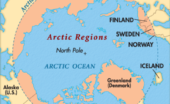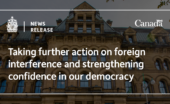Re The UN General Assembly Speaker Schedule is Here! I note that whoever will be speaking for Canada this year…
Wednesday Night #1362
Written by Diana Thebaud Nicholson // April 9, 2008 // Reports, Wednesday Nights // 2 Comments
The Report see also Wednesday-night.com
Wednesday Nighters and the arts
David showcased one of Holly Jonas’ 8-part series “A Magic Carpet Ride in Search of Canada’s Choral Best”. This prime time Thursday evening (8pm) radio series on CJMQ FM can be heard on the Web; it features the choral directors from all the Canadian provinces and territories about whom she wrote in her recently published book In Their Own Words.
Holly announced that Octet Plus, the choral group of which she and David Oliver are members, will give a concert at David’s Church (6897 Somerled Avenue – corner of Rosedale) on Saturday, April 26th at 7:00 pm. They promise A delightful programme of madrigals, classical and popular melodies in a variety of styles.
All are warmly invited to attend.
Infrastructure
The announcement that 28 Quebec bridges will be demolished and as many will undergo extensive repairs, follows an extensive review of road structures across the province by the Quebec’s transport ministry. This in turn follows the findings of the commission headed by Pierre Marc Johnson that investigated the collapse of the Concorde overpass, which included a number of factors such as design and material flaws, and inadequate road construction codes.
The government constructs a health care institution and within a few weeks, the windows start to fall out and have to be repaired. Soon after construction, a government constructed library, beautifully designed is found to have an insecure glass facing that risks falling on pedestrians. Roads are constructed that do not survive intact over a single winter. (The quality – and maintenance – of cross-border highways are vastly different on either side of the border.) Overpasses have to be replaced after relatively short periods of time.
Previous generations built for future generations; we appear to build for ourselves. The Victoria Bridge stands as a monument to the foresight, pride and hard physical labour of those who built with pride, effort and risk. Whether in politics or construction, it is perhaps to ourselves that we should look rather than attempt to find answers in the faults of others.
As Jeremy Searle points out in a recent column “Building better bridges” ancient monuments, aqueducts, as well as many European highways and overpasses, remain intact for extended periods of time. Why? Poor engineering or design, poor or non-existent supervision, poor choice of material or sloppy construction, cronyism and the great tradition of patronage. Then there is the established practice of awarding contracts to the lowest bidder, often eliminating higher quality bidders. Jeremy believes that “the real fault lies with the politicians who chose to save money by building for short life spans – which has the additional political advantage of requiring frequent repairs, with kudos for the party carrying out the repairs. There is little political advantage to constructing for future generations.
The selection of the highest bidder is not necessarily a guarantee of quality; the solution must lie in better specifications, more conscientious design, engineering and inspection of public works, and a guarantee of integrity over the projected lifespan of the structure, supported by the posting of a performance bond. We need to look at regular maintenance of our capital projects as a form of interest payment.
Possibly the fact of our crumbling infrastructure will stimulate rethinking of how it was built in the first place (examples: the Avenue du Parc interchange, Manhattan’s elimination of the West Side Highway in favour of an urban boulevard and Boston’s recently completed “Big Dig“.
After a generation of shoddy builders, we now have the Repair Generation
Public transportation
If the tipping point has not already been attained in carbon fuels, it will be at some point. Recommendations to diminish dependence on fossil fuels for transportation include less dependency on the automobile. While planning more highways to accommodate more cars and trucks, we speak of greater travel on foot and the reluctance to switch to public transportation. Yet we increase rather than reduce or eliminate fares and do nothing to increase comfort in public transportation as the supply of petroleum becomes less certain and its cost increases.
The Financial crisis
Prospects appear gloomy. Most analysts agree that Bear Stearns was merely the tip of the iceberg and that the problem is rooted in public (Federal Reserve) policy under Alan Greenspan. The rising cost of oil exacerbates inflation.
A contrarian view is that we are overly focused on the United States, while other less-noticed countries (e.g. Algeria) have flourishing economies. [We submit that those flourishing economies are being are encountering some grave difficulties over food prices and general inflation.]
Beijing Olympics and Tibet
As the 2008 Summer Olympic Games approach, there is a rising tide of support for a boycott of the opening ceremonies by Heads of State and international figures, citing the cruel suppression of the current Tibetan protests. This issue is multi-faceted and merits deeper consideration. It is obvious that the current communist Chinese government is a repressive regime that tolerates no controversy and cruelly suppresses any opposition. The current measures taken in Tibet conjure up images of the Tiananmen Square massacre. The western world tends to support the underdog except when it is its own underdog. It is important to bear in mind, however, that in the 19th century, western powers carved up coastal China into fiefdoms and therefore in the eyes of Chinese authorities, speak with little or no moral authority on the Tibet issue.
In today’s context, it is difficult for us to understand China’s heavy-handed treatment of dissidents while striving for a respected place in the global family of nations. In fact, the 2008 Olympic Games in China are evidence of the incredible steps taken in constructing a modern nation. In order to understand the paradox of the suppression of human rights there, one must take into account China’s history and evolution.
China is an immense country of over one billion citizens of diverse languages and cultures, further divided between coastal urban, regional urban and rural attitudes. Although it has been generally described as a communist country, it is probably more an evolved empire with its unelected leaders holding a tight rein on the population. Dissent, if permitted, would inevitably lead to internecine conflict and havoc. Although it should not be condoned by the western world, the policy of suppression has been an essential ingredient in China’s success in the commercial world and in its role in helping to achieve relative stability in world trade.
While in the West we attach great importance (at least in theory) to liberty of expression and freedom for the individual to challenge authority for the Chinese, ‘living in harmony’ is most important, ergo individual liberties must be trumped by the collective.
In Tibet, as elsewhere, China’s tool has been its ability to shift populations with or without their consent. A citizen’s personal file providing personal access to services leads rather than follows him in moving from place to place in China. As all services are provided by the government, life is virtually impossible without the presence of the personal file and so the government has the capacity to move large numbers of people for political reasons. In the case of Tibet, the parachuting of a significant number of Han Chinese to dominate commerce and the economy has been a prime source of the current discontent.
Should we support a boycott of the opening ceremonies? Probably; it would cause the Chinese Government to lose face, a very significant matter in China, perhaps ultimately leading to a dialogue with the Dalai Lama. On the other hand, such a response would ignore the considerable human rights abuse on the part of other countries, some closer to us, and could not possibly affect Chinese internal policy without risking the disintegration of what has been a functioning successful political system. China seeks to be part of the western world, a member of the World Trade Organization, but will not respect intellectual property rights or other rules of the game. Do we condemn the oligarchy in China while supporting theocracies in other parts of the world because it is in our interest to do so?
The Prologue
This Wednesday, it is a somewhat random-access agenda. Despite (or perhaps because of) our careful monitoring of topics of interest, we find that many are in the category of “been there, done that” too recently and there is little obvious progress in the files. However, there are others that have been somewhat neglected in the intense discussions of recent Wednesdays, much of which have focussed on the ever-widening financial crisis. Please note: under the guidance of our economic and market gurus we are careful to make the distinction between an economic and a financial crisis.
Adding to the crisis (we’re not sure of how to categorize this) is growing Asian inflation with its impact on American consumers, along with exporters from developing Asian nations.
Iraq is back with the testimony of General Petraeus in front of Congress and the recent internecine clashes between al-Sadr’s Mahdi militia and Iraqi government troops.
Kenya too has rejoined the ranks of trouble spots with news of rioting sparked by the president’s inability to grasp the meaning of powersharing.
As discussed a couple of weeks ago, the growing world hunger crisis is only just beginning to attract mainstream attention. A little-known organization, the International Assessment of Agricultural Science and Technology for Development, is presenting a new approach for ensuring food security at a meeting in Johannesburg – and guess what? The group of officials and scientists from some 60 countries has concluded that the way to meet these challenges is through combining local and traditional know-how with formal knowledge.
With the chaotic European reception of the Olympic torch relay, the on-going debate of how to deal with China‘s human rights stance and the Beijing Olympics has prompted two thought-provoking pieces that we urge you to read and consider.
The Bangkok Global Meeting on Climate Change concluded early in the morning of April 5 with, among other things, agreement to consider how to reduce rapidly growing emissions from air and sea travel.
On a different note, a happy marriage of technology and humanitarian efforts:
Google Earth a key tool for UN as it maps refugee crises
“The United Nations’ refugee agency has teamed up with Google to use the mapping program Google Earth to more effectively highlight the plights of refugees. The effort uses photos, satellite maps, videos and more to provide a vivid look at refugee crises in Darfur, Iraq, Chad and Colombia”.
For those who were with us in December when Chantal Beaubien joined us on her brief return from Cambodia, the piece on Property Boom Forces Evictions of Urban Poor bears out much of what she told us.
The U.S. election campaign continues to fascinate with its unexpected twists and turns. Mark Penn’s resignation (seems he was indeed pushed) rids us of a singularly Rovian character – we wonder how long he will last at Burson-Marsteller now that the Colombians have also fired him? We love the Economist headline: Penn put to sword.
A cheery item from the International Herald Tribune tells us :As a small chorus of superdelegates has announced a preference for Senator Barack Obama in recent weeks, a theme is emerging: their children made them do it.” As parents, we can understand the irresistible pressures and mind-numbing tortures to which these parents were subjected.
Finally, we can always count on Tony Deutsch to inject a lighter note into our deliberations. This time, he has forwarded Sex and Financial Risk Linked in Brain with the comment “Research is wonderful!”
WASHINGTON (AP) — A new brain-scan study may help explain what’s going on in the minds of financial titans when they take risky monetary gambles — sex. When young men were shown erotic pictures, they were more likely to make a larger financial gamble than if they were shown a picture of something scary, such a snake, or something neutral, such as a stapler, university researchers reported.




2 Comments on "Wednesday Night #1362"
Tibet: another perspective
Despite my comment Wednesday Night about not comprehending how people could devote so much thought and words to whether or not the Olympics’ opening should be boycotted, I found Jeannie’s contribution fascinating and worth pondering. Serendipitously I received an interesting and informative email today from a Canadian friend who lives in China and have received permission to share it with you and for you to post it to your web site, should you choose, with the proviso that the author receives credit. As you’ll see, it also provides an insider’s view of the complex situation but offers a rather different perspective [from Jeannie’s]. I now feel that I have a much better understanding of the situation and wish our journalists could grasp some of the subtle and less subtle underlying issues that they so blissfully ignore when distracting the public from more important topics (not to mention the “dishonestly cropped wire photos of Indian police beating demonstrators – with headlines placing the event in Tibet, where it did not actually happen”). David Mitchell OWN
(Stratfor) Chinese Geopolitics and the Significance of Tibet
Beijing’s Three Imperatives
Beijing has three geopolitical imperatives:
Maintain internal unity so that far powers can’t weaken the ability of the central government to defend China.
Maintain a strong coastal defense to prevent an incursion from the Pacific.
Secure China’s periphery by anchoring the country’s frontiers on impassable geographical features; in other words, hold its current borders.
In short, China’s strategy is to establish an island, defend its frontiers efficiently using its geographical isolation as a force multiplier, and, above all, maintain the power of the central government over the country, preventing regionalism and factionalism.
Note that Beijing’s first imperative is to maintain China’s internal coherence. China’s great danger is always a weakening of the central government and the development of regionalism. Beijing is far from losing control, but recently we have observed a set of interesting breakdowns. The inability to control events in Tibet is one. Significant shortages of diesel fuel is a second. Shortages of rice and other grains is a third. These are small things, but they are things that should not be happening in a country as well-heeled in terms of cash as China is, and as accustomed as it is to managing security threats.